The new BJP government will have no choice but to ask the Centre for financial support, expects Rashme Sehgal.

Accompanying Gupta are BJP Election in-charge Baijayant Panda, right, and BJP Delhi President Virendra Sachdeva, second from right.Photograph: ANI Photo
'Development wins, good government triumphs.' These were Narendra D Modi's congratulatory tweets after the Bharatiya Janata Party captured political power in the national capital after 27 years.
Delhi, where more than 33 million reside from which 9.5 million people cast their vote on February 5, saw voters obviously disillusioned with the Aam Aadmi Party government despite the push it gave to welfare schemes including free water and electricity and the revamping of both the public health and education schemes.
The last time the BJP was in power in Delhi was from 1993 to 1998. Despite it being the capital's first elected government, its tenure was marked by instability, internal conflicts and economic mismanagement.
The BJP changed three chief ministers in quick succession. The amiable Madal Lal Khurana resigned on charges of corruption and infighting making place for Sahib Singh Verma to become CM only to be cycled out two years later giving way to Delhi's first woman chief minister Sushma Swaraj.
Swaraj's 52-day tenure was too short a period to stem the tide of economic mismanagement accelerated by the sharp rise of onion prices and the BJP lost the assembly battle paving the way for Sheila Dikshit becoming chief minister.
This time around, the BJP fought the election projecting Modi as being at the helm of affairs and the victory is another affirmation that the prime minister's image as an election winner remains undented especially since this victory comes on the back of two major victories in Maharashtra and Haryana, two states where it was seen as heading for defeat.
There is no doubt that the BJP and the RSS with its huge cadres left no stone unturned to defeat AAP with ample help and resources.
The Delhi win is both a vote of confidence in the credibility of 'Modi's guarantees' and the PM's promise of 'good governance.
The Modi Sarkar claims its new welfarism offers a long list of guarantees -- pensions, subsidies, loans and scholarships -- delivered through cash transfers to bank accounts.
His government claims to have spent more than $400 billion in the past decade, delivering direct cash benefits to low-income households and reaching over 900 million people.
A yearly handout of 6,000 rupees to more than 110 million farmers constitutes one of the world's largest cash transfer programmes in the world.
He has done the same with Delhites offering a wide range of freebies including a transfer of Rs 2,500 per month to women in the lower income group plus Rs 20,000 per month to pregnant women plus free medical aid for the elderly, plus free public transport to women, plus free education from KG right up to post graduate levels for underprivileged students plus free water and electricity to all citizens.
The pluses seem to never end, not to forget his promise to clean the Yamuna and also bring down air pollution.

The moot question to be asked is whether the BJP can fulfil these pre-election promises while balancing finances.
Delhi's projected tax revenues for 2024-2025 stands at Rs 58,750 crore (Rs 587.50 billion) while the overall budget amounts to Rs 76,000 crore (Rs 760 billion).
With more than two-thirds of the budget allocated already for salaries and administrative costs, the government is looking at a huge deficit made worse by the knowledge that revenues from taxes are set to decline this fiscal year from Rs 64,142 crore (Rs 641.42 billion) to Rs 62,415 crore (Rs 624.15 billion).
The monthly Rs 2,500 payment for poor women is expected to cost Rs 11,000 crore (Rs 110 billion) while the pension scheme of Rs 2,000 for every senior citizen will cost around Rs 4,100 crore (Rs 41 billion).
The Yamuna clean up will cost over Rs 10,000 crore (Rs 100 billion) while a similar amount is required to upgrade Delhi's hospitals.
Ultimately, the new BJP government will have no choice but to ask the Centre for financial support.
The new administration has to finalise the budget for the next fiscal year by March.
Past experience has shown that the one area in which the BJP never stinges on is infrastructure expenditure and last year alone, it spent Rs 11 lakh crore on infrastructure development across the country.
The chances therefore are that some of Delhi's roads will see some improvement and there could be some decongestion on the city's roads given that the ministry of road and highways is getting a Development Regulation Plan done on the construction of three major highway projects costing over Rs 12,000 crore (Rs 120 billion) to decongest Delhi roads.
But no assessment of the BJP can be done without looking at its performance in neighbouring states where BJP governments have been at the helm.
Take Haryana which boasts of a 'double engine sarkar' for the last ten years. While travelling through Haryana last year, prior to the state going to the polls, the one complaint voiced unanimously by rich and poor was the crumbling infrastructure, the total neglect of public spaces including parks and public buildings and the overall lack of cleanliness across this tiny state.
'Haryana has become a vast slum,' was the most repeated complaint voiced across all sections of the public.
The other complaint was the lack of jobs for the youth with Haryana boasting the highest unemployment figures in the country.

The situation in Uttarakhand, which boasts of a 'triple engine sarkar' since even the municipalities are controlled by the BJP, is even worse.
One needs to ask the prime minister and his officials what is this developmental model being imposed on the state?
Concrete and steel are being poured on to Kedarnath and Badrinath built on ecologically glacial moraines.
Walls are being built along several river banks, including along the Mandakini river that flows past Kedarnath, in order to prevent flooding during the monsoon months, even when a school student living there will inform you that when these mountainous rivers are in flood, they will tear down anything that comes in their path.
All environmental norms have been thrown to the winds and the state has now started the amazing exercise of building a wall around parts of the Rajaji tiger sanctuary in order to try and confine animals to a limited space.
The motive of this exercise is to allow 'development projects' -- read resorts and hotels -- to come up in areas adjacent to this premier sanctuary.
What are the developmental parameters of Uttar Pradesh, which has been found lagging behind other states across all social indicators including health, education, sanitation, and gender equality, ranking among the lowest in the country, after Bihar?
High infant mortality rates, low immunisation coverage, and limited access to quality healthcare facilities are prevalent in UP which suffers from high poverty levels and with a large population who lacks access to basic services.
The financial situation is so dire in UP that the state government halted the Akshay Patra mid-day meal scheme for poor school children because it was not in a position to meet the costs.
Farmers growing sugarcane have not been paid and the state government owes thousands of crores of rupees to the sugar mills.

Regarding the much touted plan to clean the Yamuna, all one can say is that cleaning rivers is an interstate activity and should have been undertaken by the ministry of environment and forests when Modi came to power in 2014.
It is the same with pollution. The central government has not held a single press conference on solving this problem even when AQI levels crossed 1000 post Diwali for the last five years.
What the BJP has mastered is the art of managing electoral campaigns. The best minds are hired for this. Money is spent freely.
In Delhi the BJP tailored its campaign group-wise, given the city's diverse linguistic, regional and social diversity.
The big rallies were limited to the top leaders while the party's local leaders focused on small meetings, including drawing room ones.
The thoroughness with which this subject of elections are addressed can be illustrated in the way a team of BJP leaders led by national General Secretary Tarun Chugh and former Union minister Rajeev Chandrasekhar conducted around 5,000 such small meetings in the seven weeks before the voting.

Feature Presentation: Aslam Hunani/Rediff.com
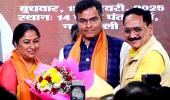

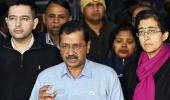
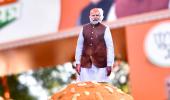




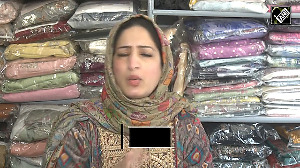

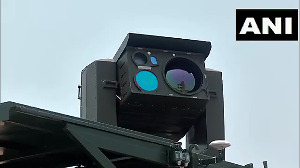
 © 2025
© 2025